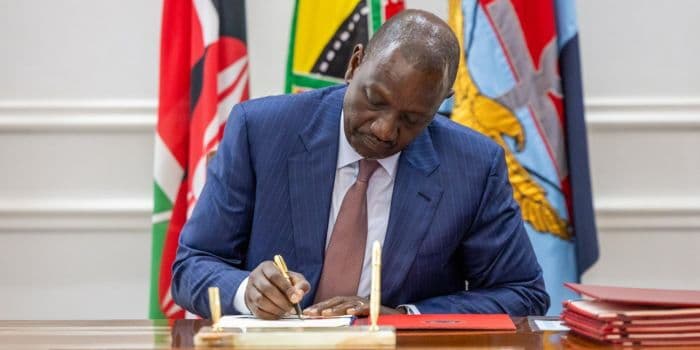We're loading the full news article for you. This includes the article content, images, author information, and related articles.
New law compels public officers to steer clear of self-dealing and expands EACC powers.

Nairobi | July 30, 2025
In a major anti-corruption milestone, President William Ruto has signed into law the long-awaited Conflict of Interest Act, 2025, replacing the 21-year-old Public Officer Ethics Act of 2003. The new law creates a far-reaching legal framework compelling transparency, regular asset disclosures, and stricter oversight of public officials’ dealings—after a prolonged standoff between the Senate and National Assembly nearly derailed it.
The Conflict of Interest Act aims to close longstanding legal loopholes that have allowed public officers to engage in opaque procurement, appointment, and contract decisions while hiding behind outdated ethics provisions.
Key highlights include:
Mandatory declaration of conflicts of interest—including family ties and financial benefits—in all official dealings.
Biennial asset declarations by all public officials, submitted to the Ethics and Anti-Corruption Commission (EACC).
Severe penalties for non-disclosure, including disqualification from office, fines, and possible jail terms.
Empowerment of the EACC to initiate investigations, freeze suspicious assets, and compel cooperation across all levels of government.
President Ruto hailed the law as a “bold step in restoring public trust and sanitizing state operations.”
“This law marks the beginning of a new era of integrity and accountability in public service,” he said during the signing at State House Nairobi.
First introduced in 2023 by Majority Leader Kimani Ichung’wah, the Bill was passed by the National Assembly but heavily amended by the Senate. The two chambers engaged in mediation in early 2025 after disagreements emerged over enforcement powers and disclosure timelines.
Ruto later returned the Bill to Parliament with his own reservations—primarily concerning exemptions for certain offices and enforcement consistency. These recommendations were incorporated into the final version passed in June and July 2025.
|
Area |
Old Ethics Law (2003) |
New Conflict-of-Interest Act (2025) |
|---|---|---|
|
Asset Declarations |
Once every four years |
Every two years (biennial) |
|
Conflict Disclosures |
Vague; self-regulated |
Mandatory, real-time disclosures |
|
Oversight Power |
Weak EACC authority |
EACC can now enforce, freeze assets, prosecute |
|
Procurement Integrity |
No specific rules on relational bias |
Bars participation in decisions with personal ties |
|
Penalties |
Minimal enforcement |
Disqualification, criminal liability, fines |
Kenya has long battled high-level corruption, with multiple reports citing gaps in enforcement and political patronage. The new Act aligns Kenya more closely with international anti-corruption frameworks, including African Union guidelines and UN Convention Against Corruption (UNCAC) obligations.
It also bolsters citizen watchdog efforts by making conflict declarations publicly accessible through gazettement and digitized records.
Legal analysts say the Act provides the tools EACC needs to pursue high-value targets without political interference.
“For the first time, we have a law that gives real bite to ethics enforcement,” said Dr. Muthoni Kariuki, governance expert and legal scholar. “But the real test will be political will.”
EACC will now roll out new guidelines and reporting platforms.
All public officers, from Cabinet Secretaries to County Directors, must declare financial interests by December 2025.
Parliament is expected to table amendments to other laws to align them with the new conflict-of-interest standards.
President Ruto’s assent to the Conflict-of-Interest Act signals Kenya’s commitment to institutional integrity—but successful implementation will depend on consistent enforcement, civil society vigilance, and zero tolerance for backtracking.
As the EACC prepares to flex its newly granted powers, Kenya will be watching to see if this bold legal step finally shifts the culture of impunity into one of public accountability.
Keep the conversation in one place—threads here stay linked to the story and in the forums.
Sign in to start a discussion
Start a conversation about this story and keep it linked here.
Other hot threads
E-sports and Gaming Community in Kenya
Active 9 months ago
The Role of Technology in Modern Agriculture (AgriTech)
Active 9 months ago
Popular Recreational Activities Across Counties
Active 9 months ago
Investing in Youth Sports Development Programs
Active 9 months ago